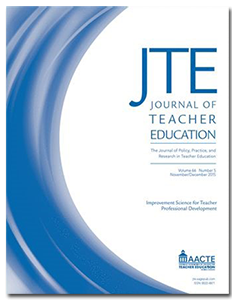JTE Author Interview: Alastair Henry on Preservice Teachers’ Identity Development

Have you seen the JTE Insider blog managed by the Journal of Teacher Education (JTE) editorial team? Check out the latest entry below.
In this author interview, Alastair Henry discusses his article, “Conceptualizing Teacher Identity as a Complex Dynamic System: The Inner Dynamics of Transformations During a Practicum,” published in the September/October issue of JTE.
Q: What motivated you to pursue this particular research topic?
A: I am a teacher educator and like all of us who mentor preservice teachers, I was curious about the processes of professional identity development and the changes that take place when students are away doing practicum learning. I find that it is not at all unusual that students come back to campus with very different outlooks on education and perspectives on being a teacher, and so I wanted to find out more about these emergent identities and how shifts between different identities take place.
The other thing that made me want to do this research is that, in my work on language learning motivation, I have recently been using complex dynamic systems methodologies, and the investigation of preservice teachers’ identity changes seemed a good topic for an extension of this work. It was also exciting to explore the potential of this fascinating metatheory in another field. Using complexity theories means that in research designs you will often want to examine growth or other dynamic phenomena on different timescales. So, in my study, I wanted to look at changes in teacher identities that took place not just across the practicum as a whole, but also on shorter timescales, such as from one day to another, and during a particular lesson.
Q: What were some difficulties you encountered with the research?
A: To investigate changes taking place across shorter periods, I decided to use data from a student–maintained discussion forum and from video recordings of students’ classroom teaching and immediately subsequent stimulated–recall discussions. To do this meant that I needed to recruit students who were motivated to write about their day’s experiences every evening (quite an undertaking!) and who would be comfortable being videoed while teaching. Luckily, I found two wonderful students who were willing to do this, and it is no exaggeration to say that the success of the project was due to their enthusiasm, cooperation, and diligent recording of their experiences.
Q: Writing, by necessity, requires leaving certain things on the cutting room floor. What didn’t make it into the article that you want to talk about?
A: That is so true! It was with great reluctance that in the JTE paper I only had space to examine the identity dynamics of one of the two students. I would love to publish the analyses of the other student’s teacher identity development too, and hopefully I will be able to do that sometime soon.
Q: What current areas of research are you pursuing?
A: Most of my research is in language education. At the moment I am working on a project examining the practice of teachers of English as a foreign language who are successful in generating motivation by drawing on students’ encounters and experiences with the language outside the classroom, and in this project we have conducted over 250 ethnographic classroom observations. I am also very interested in motivation theory and am currently developing a complexity–inspired model of multilingual motivation.
Q: What advice would you give to new scholars in teacher education?
A: Well, I am also a newcomer to teacher education research! Obviously, there are many areas that remain unexplored, and my advice would be to think out of the box and not to be too heavily influenced by previous paradigms in the field. There are a lot of interesting developments in other fields of education research and beyond, not least work with complexity theory, and I think that teacher education research would be receptive to many of the ideas and conceptualizations used in the investigation of dynamic systems.
Alastair Henry works in the Department of Social and Behavioral Studies at University West in Trollhättan, Sweden.






